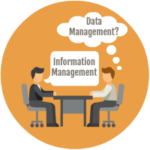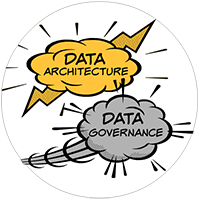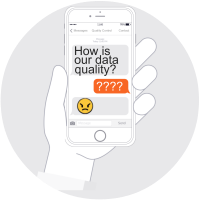We started our blog back in April 2016, and today we’re celebrating our 100th article with a look back on the top five most popular ones, based on the highest number of views, reader comments and shares on social media.
If you’re new to our blog, we cover a variety of topics (to date, more than 20) from our data and information management industry. But certain topics brought in more interest; here’s our current top five.
 Difference Between IM and DM
Difference Between IM and DM
In the number one blog post from our top-five list, What’s the Difference Between Information Management and Data Management?, our founder and CEO Kelle O’Neal talks about our buzzword-heavy industry and how there can be confusion about the meaning of certain words and phrases. She says that over the years, our clients have asked about industry concepts, like Information Management and Data Management because they want to be sure they understand leading strategies and terminology and the value these bring to an organization.
Kelle says that while the two terms are easy to confuse, there are key differences which she explains in her article.
New Thoughts on the Topic
While Kelle hasn’t had a client ask her about the IM and DM differences recently, she continues to find that certain concepts are still discussed and debated. She hopes we explore more topics like this on our blog, so we can do our part to help bring clarity to the confusion.
Read Kelle’s IM and DM article.
 California Consumer Privacy Act of 2018
California Consumer Privacy Act of 2018
Our Chief Innovation Officer Malcolm Chisholm shared his thoughts on the California Consumer Privacy Act of 2018 (CCPA), which California governor Jerry Brown signed into law June 28 of this year. With the General Data Protection Regulation (GDPR) being top-of-mind (its implementation date was May 25, 2018), Malcolm recognized that many would wonder about the differences and similarities between the two regulations.
In his California Consumer Privacy Act of 2018 vs. GDPR article, Malcolm highlights key points from the new law — contrasting and comparing CCPA to the GDPR.
New Thoughts on the Topic
Malcolm looks forward to sharing his perspectives on the next US-state bills, Ohio’s Senate Bill 220 and Colorado’s House Bill 18-1128. He said that this is only the beginning as more states will seek to protect their citizens with data privacy laws that cover areas not currently addressed by a federal data privacy law.
 Data Remediation Defined
Data Remediation Defined
Our senior consultant, Angie Pribor, has written three articles for our blog. Her most recent, What is Data Remediation and Why is It Needed?, defines data remediation as an activity that’s focused on cleansing, organizing and migrating data so it’s fit for purpose or use. Angie says that the process typically involves detecting and correcting (or removing) corrupt or inaccurate records by replacing, modifying or deleting the “dirty” data. It can be performed manually, with cleansing tools, as a batch process (script), through data migration or a combination of these methods.
New Thoughts on the Topic
We checked back with Angie for follow-up thoughts on data remediation. “What continues to surprise me working with various clients and talking to others in the field,” Angie says, “is the lack of interest in practicing healthy remediation and migration habits.”
Angie mentions several key areas that should be a focus — for example, what mechanism does the organization use to prioritize data quality issues? She asks:
- Is there a business intake/help desk function in place? (Issues shouldn’t be routed to IT!) Not all quality-related concerns are created equal, so an agile approach is needed for how requests are submitted.
- Are triage and assessment protocols efficient, and do they provide the critical valuation of the reported issue? If there are 20 issue requests, they all can’t be the number-one priority.
- You’ve heard prevention is worth a pound of cure, right? Before data remediation is prioritized and planned out, the organization should identify short-term, intermediate and long-term prevention that can stop the bleeding. (At least the mountain of issues won’t get much higher!) Often, issues are grouped together in a way that makes it difficult to unravel and investigate.
Read Angie’s data remediation article.
 Data Architecture and Data Governance
Data Architecture and Data Governance
In Data Architecture and Data Governance: What’s the Relationship?, we talked about some famous pairings — Batman and Robin, Hans Solo and Chewbacca and Mario and Luigi — and how Data Architecture and Data Governance are also aligned to support each other in an organization. (Think: increasing operational efficiency, decreasing costs, mitigating risk, etc.)
New Thoughts on the Topic
These topics are foundational and time-tested, yet there’s still much to say on this topic. (Case in point: Check out our architecture and governance story archives.) Why are these concepts so important? As Kelle says, “By fostering synergy between your Data Governance and Data Architecture groups — and their people, processes and policies — an organization’s data management area will reap the rewards of a stronger structure and one that’s in alignment with larger goals.” And what organization wouldn’t want that?
Read Kelle’s “dynamic duo” article.
 Is Data Quality Important for Big Data?
Is Data Quality Important for Big Data?
Industry veteran John Ladley shared his thoughts on a topic that some may consider up for debate — whether large volumes of data can, in effect, dampen out any data inconsistency. On our blog, he asked the question Is Data Quality Important for Big Data? and covered quality issues that can impede the success of Big Data, Data Lake and related projects.
He talked about key data quality dimensions — completeness, timeliness, conformity, uniqueness, integrity, consistency and accuracy — and stressed the importance of aligning business goals with data understanding (quality being a part of that understanding).
New Thoughts on the Topic
According to Google Trends, online interest in the term Big Data hit its peak in 2014. Though the buzz word might not be as buzzy, there’s been no decrease in the volume and complexity of data that most organizations deal with. Managing large volumes of data is one of the most common challenges for our clients — and coupled with this is the organizational need to derive insights and information from trusted data.
Data quality is a topic we’ll continue to cover on our blog, and we encourage you to subscribe to be notified of our newest perspectives and the industry events we’re supporting. If you’re particularly passionate about data quality, consider reading The Leader’s Data Manifesto — and then joining John and Kelle by signing it as a public statement that you agree quality is necessary and critical for Big Data and all data types and initiatives.
Read John’s data quality article.

